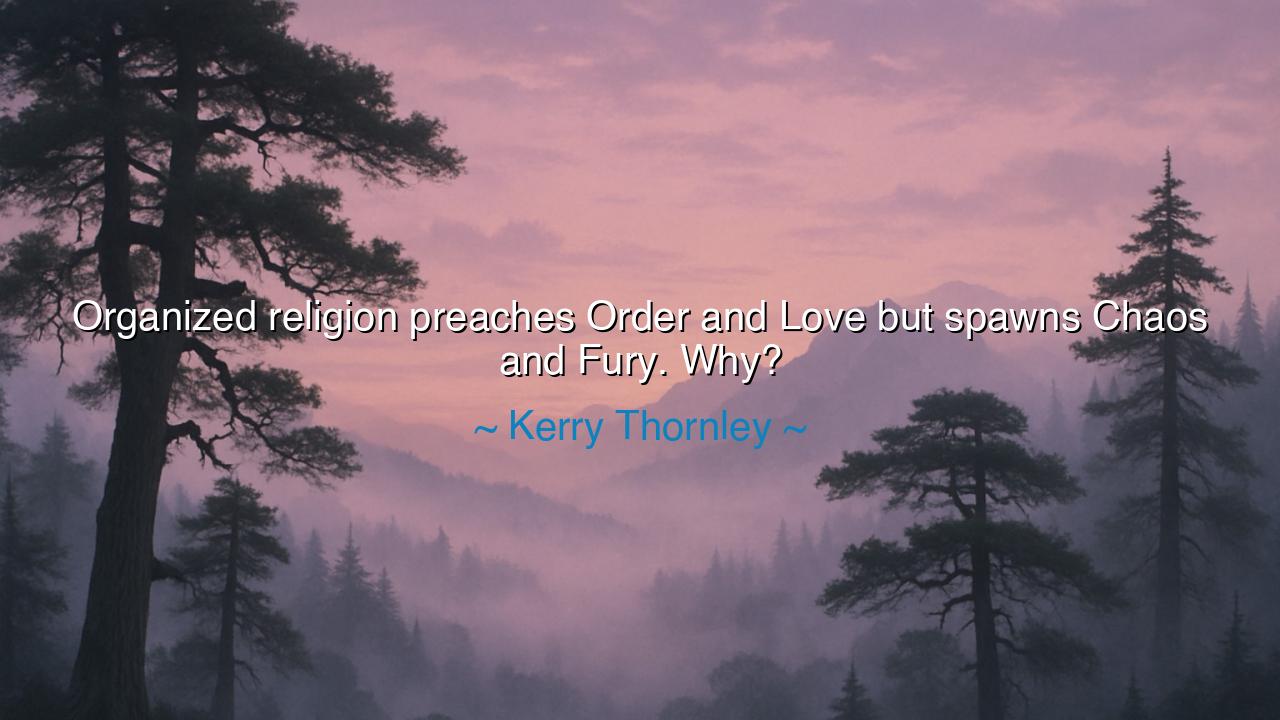
Organized religion preaches Order and Love but spawns Chaos and






"Organized religion preaches Order and Love but spawns Chaos and Fury. Why?" These words from Kerry Thornley reveal a deep paradox within organized religion—a system that promises peace, order, and love, but often, instead, breeds division, conflict, and violence. Thornley’s question is both probing and powerful, challenging us to look at the ways in which human nature, power, and ideology interact within religious institutions. Why is it that something so inherently good, like love and order, can often become twisted into something destructive? To answer this, we must delve into the nature of organized religion itself, its promises, its flaws, and the ways in which its ideals clash with the imperfections of humanity.
In the ancient world, religion was often tied to both personal salvation and social control. The early religious systems, from the Greeks to the Romans, believed that the gods governed not just the heavens but the earth itself, and their laws were both sacred and political. The idea of a divine order meant that there was a moral framework by which to live—one that emphasized harmony, justice, and love for one's fellow beings. Yet, even in these early societies, religion was used to maintain power and control over the masses. The priests and philosophers preached about virtue, but the powerful rulers often exploited religion to justify war, slavery, and subjugation.
The conflict that Thornley points out arises when human fallibility meets the ideals of religion. The religions of the ancient world often preached peace and unity but were also the cause of wars and conquest. The Crusades, for example, were supposed to be religious wars meant to reclaim the Holy Land, but in reality, they were battles fueled by both religious zealotry and political power. The clergy preached love and brotherhood, but the soldiers who fought were often driven by personal ambition or greed—a stark contradiction to the values they were supposed to uphold. Even today, many religious conflicts continue to be driven by a clash between ideals and human nature—where faith becomes the rallying cry for war, instead of the source of peace.
History gives us many examples of how the promise of order and love in religion can descend into chaos and fury. The Inquisition of the Middle Ages, for example, was intended to bring heretics to the light of Christian truth, but it often resulted in torture, persecution, and fear. The Catholic Church preached salvation, yet became an instrument of oppression, causing untold suffering in the name of preserving religious purity. This dichotomy between the teachings of love and the actions of violence remains one of the most difficult contradictions to reconcile in organized religion. The same religious authorities that promoted the love of God and neighbor also wielded great power to silence dissent, impose conformity, and create fear.
Even in modern times, Thornley’s observation rings true. Organized religion, for all its good intentions, can sometimes foster an us vs. them mentality. Religious fundamentalism, whether in the form of Christianity, Islam, or other faiths, has led to the rise of violent extremism, often invoking religious ideology to justify actions that seem to stand in direct contradiction to the principles of love and peace. In these cases, the ideal of love becomes weaponized, and the order that religion promises becomes a tool for imposing control and division.
Consider the example of Gandhi, whose approach to religion and politics was radically different from the violent paths others took. Gandhi sought to unite India through the practice of non-violence (Ahimsa) and truth (Satya), inspired by his understanding of Hinduism. Rather than using religion to justify violence, he used it as a force for peaceful resistance to British imperial rule. His spiritual beliefs were deeply rooted in his commitment to human dignity and freedom, but he understood that true religious practice should never be used to inflict harm. His ability to embody love and non-violence, even in the face of oppression, stands as a powerful testament to the possibility of faith being used as a force for good rather than chaos.
The lesson in Thornley’s quote is this: organized religion, when wielded by imperfect humans, can become a tool for control, division, and violence, even when its core message is one of love and peace. The temptation to use religion to justify personal power, to elevate one's own beliefs above others, is a profound danger. We must look at the history of religion and recognize that its beauty and potential for good can be clouded by the human desire for dominance and conformity. Religion is meant to uplift the soul, not to enforce dogma or control others.
In our own lives, we must strive to practice our beliefs in ways that promote unity and peace. We should reject the corruption of religion for political gain or personal power, and instead focus on its deeper, more universal truths—truths that bind us together in compassion, understanding, and love. Let us be mindful of the human flaws that often distort our noble ideals and seek to foster a religious practice that uplifts, rather than divides. May we all live in the spirit of true faith, one that calls us to love and serve one another, regardless of our differences.






AAdministratorAdministrator
Welcome, honored guests. Please leave a comment, we will respond soon